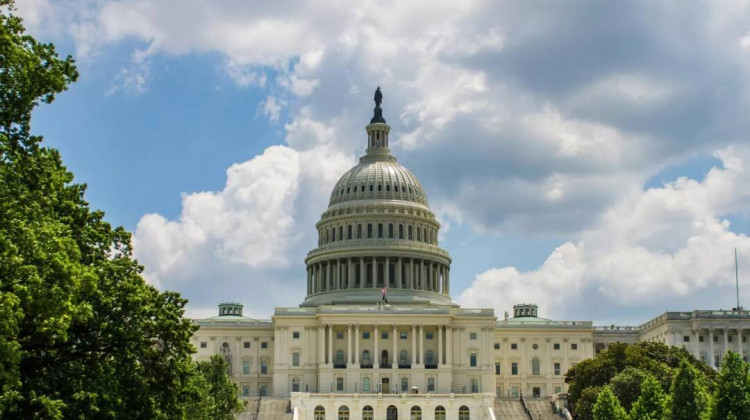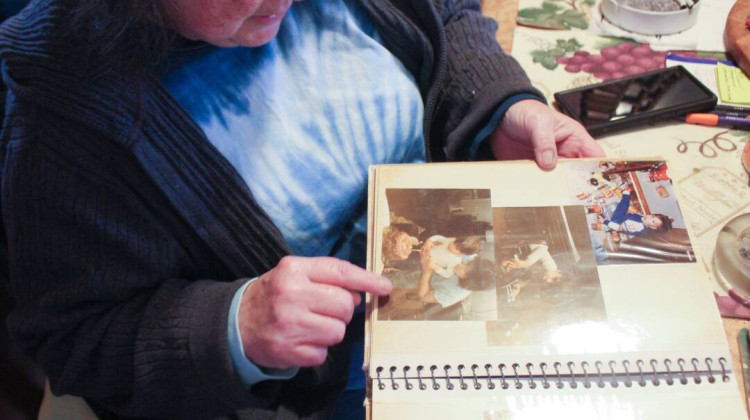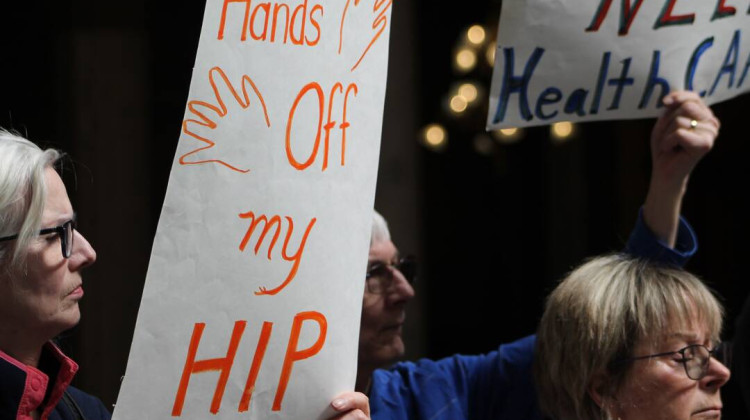
Signs are posted at Masjid Al-Fajr in Indianapolis to remind worshippers of COVID-19 precautions while praying.
Lauren Chapman/IPB NewsListen to the radio version of this story
Many employees are turning to religious exemptions as vaccine mandates become more common in workplaces. Exemptions are federally protected under the Civil Rights Act of 1964. But what is the history of these exemptions and what are the consequences?
Imam Ahmed Alamine frequently speaks to his mosque in Indianapolis about getting vaccinated. In fact, he’s trying to set up a clinic at the mosque to make it easier to do so. For him, getting people vaccinated is just as much about faith as it is personal. He had COVID-19 in April 2020.
"I–my experience with malaria was horrible. But COVID was worse," Alamine said. "I never thought–every day that passed by or night, I would just assume that would be my last day or night. When I was asked to compare it to malaria, I would say it's double or triple malaria."
A handful of vaccines – some MMR, shingles and nasal flu vaccines – use pig technology, specifically porcine gelatin, as a stabilizer. That goes against religious dietary restrictions for some Jews and Muslims, which are a common reason for religious vaccine exemptions.
READ MORE: What laws say about religious exemptions and how Indiana lawmakers could change them
Join the conversation and sign up for the Indiana Two-Way. Text "Indiana" to 73224. Your comments and questions in response to our weekly text help us find the answers you need on statewide issues.
Alamine said the Quran makes an exception for medicine.
"Islam does allow to use something that is normally forbidden – use it as a medication," Alamine said. "It is going to be an accepted way to cheat, as long as it helps saving somebody’s life."
None of the COVID-19 vaccines available in the U.S. use porcine gelatin. Alamine said he doesn’t support Muslims using religious exemptions for vaccine mandates.
With more people pushing for broader exemptions, he said all faith traditions should encourage vaccines.
"We have to use the faith to save people’s lives. We should not use faith to destruct humanity, to cause harm to humanity," he said. "If you don’t want to take vaccine, that’s your choice. But please do not use faith as a weapon."
There’s a long history of protecting religious expression in the U.S. Religious exemptions are federally protected in the Civil Rights Act of 1964. Rigel Oliveri, law professor at the University of Missouri, said these are in a section called Title VII – which specifically addresses employment discrimination. It also includes "reasonable accommodations" for "sincerely held religious beliefs."
"The courts are very reluctant to intrude too deeply on what a person's sincerely held religious beliefs are. So it doesn't have to be something that comes from a mainstream faith tradition. It can be a much more personalized belief system," she said. "You know, we–what we really wouldn't want is courts sort of deciding what counts as religion and what doesn't."

And so courts have given wide berth to religious beliefs – with a few caveats. Title VII says employers do not need to make accommodations that create an undue burden. That’s where Oliveri said the limitations lie for religious exemptions for COVID-19 vaccine mandates.
"But what's very clear, when it comes to the Title VII mandates, is that the religious exemption is–is not a giant loophole you can just walk through," Oliveri said.
And there’s a reason for that – exemptions can have real consequences. Dr. Saad Omer is director of the Yale Institute for Global Health and an epidemiologist.
He said with any non-medical exemption to vaccines it requires a "Goldilocks approach." If exemptions are too hard to obtain, Omer says research shows people will find other ways to navigate around mandates.
"And if they are freely available, we know that they tend to cluster. And they can contribute to – we have shown first, against multiple diseases now – that they can impact the local epidemiology of disease and can be associated with outbreaks," Omer said.
Those clusters have consequences for unvaccinated and vaccinated members of the community. In a good year, flu vaccines hit about 40 percent efficacy. The mRNA COVID-19 vaccines boasted about a 90 percent efficacy. But no vaccine is 100 percent.
"And so that increases everyone's risk. And so there are consequences for folks," Omer said.
Throughout the pandemic, Imam Alamine invited epidemiologists and other health experts to talk to his mosque about social distancing and vaccines. In fact, he calls efforts to get people vaccinated a jihad.
"When people hear the term jihad – the only thing they know about is the extreme violence. But jihad simply means struggle and resistance," he said. "And this is our jihad – it’s our resistance against an enemy for humanity. A virus that claimed the lives of hundreds of thousands around the world."
Contact Lauren at lchapman@wfyi.org or follow her on Twitter at @laurenechapman_.
9(MDAyMzk1MzA4MDE2MjY3OTY1MjM5ZDJjYQ000))
 DONATE
DONATE







 View More Articles
View More Articles

 Support WFYI. We can't do it without you.
Support WFYI. We can't do it without you.